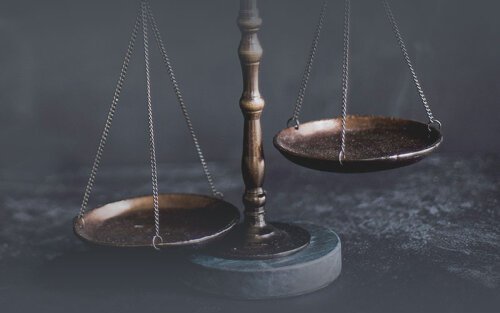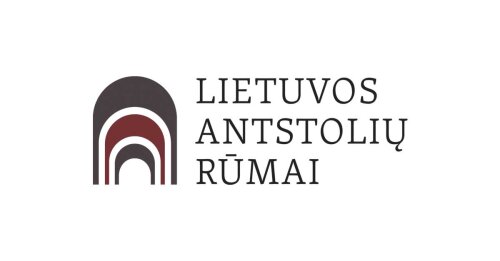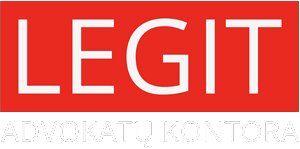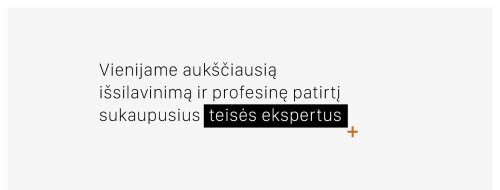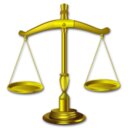Best Debt & Collection Lawyers in Republic of Lithuania
Share your needs with us, get contacted by law firms.
Free. Takes 2 min.
Or refine your search by selecting a city:
List of the best lawyers in Republic of Lithuania
About Debt & Collection Law in Republic of Lithuania
Debt & Collection law in the Republic of Lithuania governs how creditors can pursue outstanding debts from debtors. This includes actions such as debt collection, debt recovery, and insolvency proceedings.
Why You May Need a Lawyer
You may need a lawyer in cases where you are struggling with debt repayment, facing harassment from debt collectors, or are unsure of your rights as a debtor. A lawyer can provide legal advice, negotiate with creditors on your behalf, and represent you in legal proceedings if necessary.
Local Laws Overview
In Republic of Lithuania, the Civil Code and the Law on Insolvency of Legal Entities are the main laws governing debt collection and insolvency. Creditors can pursue debt collection through court proceedings, enforcement actions, or through alternative dispute resolution mechanisms. Debtors also have rights and protections under the law, including the right to challenge unfair debt collection practices.
Frequently Asked Questions
1. Can a creditor seize my assets if I fail to repay my debts?
Yes, creditors can pursue enforcement actions to recover debts, including seizing assets, garnishing wages, or placing liens on property.
2. How can I stop harassing phone calls from debt collectors?
You can send a written request to the debt collector asking them to cease contact. If the harassment continues, you may file a complaint with the State Consumer Rights Protection Authority.
3. Can I negotiate a debt settlement with my creditors?
Yes, you can negotiate a debt settlement with your creditors to repay a reduced amount of the debt or establish a payment plan.
4. What are my rights if I am being sued by a creditor?
You have the right to defend yourself in court, challenge the validity of the debt, and negotiate a settlement with the creditor.
5. How does the insolvency process work in Republic of Lithuania?
The insolvency process involves the restructuring of debts or the liquidation of assets to repay creditors. Legal entities can file for insolvency under the Law on Insolvency of Legal Entities.
6. Can I discharge my debts through bankruptcy in Republic of Lithuania?
Individual debtors can file for personal bankruptcy under the Law on Personal Bankruptcy, which allows for the discharge of certain debts.
7. What are the consequences of defaulting on a loan in Republic of Lithuania?
Defaulting on a loan can result in legal action by creditors, including the seizure of assets, negative credit reporting, and potential insolvency proceedings.
8. Are there any debt relief programs available in Republic of Lithuania?
There are debt relief programs available for individuals facing financial hardship, such as debt restructuring or debt forgiveness schemes.
9. What are my rights as a debtor in Republic of Lithuania?
Debtors have rights under the law, including the right to fair debt collection practices, protection from harassment, and the right to challenge the validity of debts.
10. How can I find a reputable debt collection lawyer in Republic of Lithuania?
You can search for a reputable debt collection lawyer through the Lithuanian Bar Association or seek recommendations from other legal professionals.
Additional Resources
The State Consumer Rights Protection Authority and the Lithuanian Bar Association are valuable resources for individuals seeking legal advice on debt collection and insolvency issues in Republic of Lithuania.
Next Steps
If you are facing debt collection issues in Republic of Lithuania, consider consulting with a qualified debt collection lawyer who can provide guidance on your rights and legal options. It's important to act promptly to protect your interests and seek a resolution to your debt-related problems.
Lawzana helps you find the best lawyers and law firms in Republic of Lithuania through a curated and pre-screened list of qualified legal professionals. Our platform offers rankings and detailed profiles of attorneys and law firms, allowing you to compare based on practice areas, including Debt & Collection, experience, and client feedback.
Each profile includes a description of the firm's areas of practice, client reviews, team members and partners, year of establishment, spoken languages, office locations, contact information, social media presence, and any published articles or resources. Most firms on our platform speak English and are experienced in both local and international legal matters.
Get a quote from top-rated law firms in Republic of Lithuania — quickly, securely, and without unnecessary hassle.
Disclaimer:
The information provided on this page is for general informational purposes only and does not constitute legal advice. While we strive to ensure the accuracy and relevance of the content, legal information may change over time, and interpretations of the law can vary. You should always consult with a qualified legal professional for advice specific to your situation.
We disclaim all liability for actions taken or not taken based on the content of this page. If you believe any information is incorrect or outdated, please contact us, and we will review and update it where appropriate.
Browse debt & collection law firms by city in Republic of Lithuania
Refine your search by selecting a city.



